- Home
- Susan Hill
Betrayal of Trust Page 10
Betrayal of Trust Read online
Page 10
The phone rang.
‘Miss Wilcox?’
The cat was weaving round her ankles.
‘This is Sister Moss from Babbacombe House.’
Sister Moss. They called themselves Matron this and Sister that, Nurse the other. But were they?
‘Yes?’
‘Is this a good time for us to have a word? It’s about Olive.’
What else would it be about?
‘Is she all right?’
Lenny knew there was trouble.
‘This is not very easy, I’m afraid.’
‘What’s she done?’
‘We need you to come down here. To discuss everything.’
‘Everything? How can we do that?’
‘It isn’t really very suitable to talk about it on the telephone, but …’
Lenny listened. Just let the woman talk. She had known it was trouble.
Trouble.
The woman who called herself Sister finished at last and Lenny put the phone down. It was tiresome. They were paid enough and now they couldn’t cope. She knew what was coming. ‘We’re very much afraid …’
She had said she would drive down there tomorrow. So that was what she would do.
She found Satie and started to play and could not stop playing and suddenly it was afternoon. That was what happened. But she felt calmer. Better. Satie did that. She wasn’t angry now.
Lenny ate a tin of pilchards and a tomato and went to sleep.
Seventeen
THE MAN CLIPPING the hedge had died ten years earlier.
‘Don’t think he was going to give us anything new but it would have been tidy. Cadsdens?’
‘Found them. They divorced and she moved to Angus Road. No other occupant on the electoral roll.’
‘The bus driver?’
‘Retired to Scarborough to live near his daughter. Still there.’
‘Scarborough.’ They had not been far from there when he had stood on a rock with a fierce tide coming in and he had clung to a child murderer for what had felt like days while the 202 Squadron Sea King helicopter had hovered overhead and the pilot tried to determine how dangerous it would be to winch them aboard. Simon could close his eyes and feel the spray on his face, hear the roar of the chopper engine above his head. Cliffs. Cliffs and caves and fast incoming tides.
It was not a part of the country he was anxious to visit again.
‘Nice trip,’ Vanek said.
‘No money for seaside treats. Phone.’
‘Oh, guv …’
‘If the bus driver saw Harriet get into a blue Vauxhall Astra driven by a man in dark glasses we’ll go. Otherwise, phone.’
‘A blue Vauxhall As—’
‘Oh, for God’s sake.’
‘Ah, I get you.’
‘For a bright-ish DS you can be very slow.’
Ben Vanek looked embarrassed. ‘Shall I go and talk to Mrs Cadsden?’
‘No, we will. But I’ll call the bus driver myself – what was his name? Johnson. Charlie Johnson.’
‘I’ve just emailed the number across to you.’
‘Thanks.’
Simon went back to his office. He hadn’t meant to come down so hard on the sergeant and he was annoyed with himself.
‘Good morning. My name is Simon Serrailler – Detective Chief Superintendent Serrailler from Lafferton CID. I’d like to speak to Mr Charles Johnson if that’s possible.’
A woman had answered. Middle-aged. Yorkshire accent.
‘Where did you say?’
He told her again.
‘Well, Dad hasn’t lived down in Lafferton for seven going on eight years.’
‘Yes, I do know he retired and moved away. Who am I speaking to?’
‘Ann Sharp. Mrs Sharp. I’m Charlie Johnson’s daughter.’
‘Mrs Sharp, I do need to speak to your father if I may. If he isn’t with you perhaps you could give me a contact number? I’m investigating the –’
‘No.’
‘Sorry?’
‘You can’t speak to him. Dad had a stroke four months back. He hasn’t left hospital. He can’t speak, he can’t move. He understands, and he knows us. He’s not – he’s all there. But he couldn’t answer any questions, and apart from anything else, I wouldn’t let him. I wouldn’t let him be upset by anyone from the police.’
‘I see. I’m very sorry. But it just might be that we would need to talk to your father at some point, Mrs Sharp. It depends on the progress of our inquiries. If it were necessary, I might need to ask him just one or two questions … you say he can understand? Just a nod or a movement of his hand, for yes or no —’
‘What’s Dad supposed to have done, for goodness’ sake?’
‘Nothing at all. But he was a witness some years ago now. A young girl was waiting at the stop for a bus he was driving and —’
‘But he hasn’t driven a bus for eight, nine years.’
‘I know. This was sixteen years ago. A young girl went missing – she was due to catch his bus but she didn’t.’
‘Well, that can’t have been Dad’s fault, can it?’
‘No. There’s no suggestion of that.’
‘Was he not spoken to at the time? How come you’re ringing now?’
‘Yes, he was, he gave a full statement.’
‘Then he wouldn’t have anything else to say, would he? Dad’s an honest man and he’s very ill too and I wouldn’t give any sort of permission to you to come mithering him. You could kill him. Have you thought of that?’
Simon fished out the original interviews with Charlie Johnson. They were simple, straightforward, without interest. He was sure that Harriet Lowther had not got on to his bus and he had continued his journey into Lafferton. Nothing had happened. No one had looked back. Why would they?
‘Guv? I’ve got a hospital appointment, check on the foot.’
Simon waved Ben away. He felt irritable and at a dead end with the investigation. The sergeant couldn’t help.
There were three people left on his main list – Mrs Cadsden. Her daughter Katie who had been Harriet’s friend. And John Lowther. Serrailler did not want to have to interview him formally again but it was probably unavoidable.
Before he saw him, though, he needed to hold a press conference. Harriet’s disappearance was still recent enough to be remembered. He wanted memories jogged, wanted people to start talking to one another, looking back, checking over things they might suddenly realise could be relevant after all.
When Vanek returned they went through the plans together.
‘What about a reconstruction? I know it’s a long time ago but it’s amazing how they jolt people’s memories. I had two in my old force and they both led to convictions.’
‘If it were even just a couple of years ago I’d have organised one, but I doubt if I can balance cost against the very slight chance of success. Not at the moment. We’ll have to explore other avenues first. Did the hospital sign you off by the way?’
‘No. Got to go back for another X-ray in two weeks.’
Simon smiled. ‘So you can’t possibly be expected to hang around underpasses, let alone chase after pushers.’
Ben shook his head, drawing his breath in sharply.
‘Good stuff. Come on – let’s call on Mrs Cadsden.’
But the phone rang first.
‘Gordon Lyman. About this second skeleton.’
‘Have you found something?’
‘Not on the skeleton itself, but I’ve got a bit of time owing me and I’d quite like to do some work on this. You know about computer-aided facial reconstruction? I’m rather keen to get more practice. A colleague at UCH, Declan Devey, is something of an expert. He’s going to help, teach me a few tricks – via computer. Should be interesting and we’ll end up with a likeness you can put out there.’
‘How long will it take?’
‘Depends. But we’ll get something.’
Angus Road was a cul-de-sac of 1920s semi-detached houses with bow wi
ndows. Number 52 was almost at the end. The street was quiet when they got out of the car, but the sound of children in a school playground nearby gave it some life.
‘Most people are at work,’ Simon said. ‘Can’t you tell? Our Mrs Cadsden will be too.’
But she was not.
Frances Cadsden was now a smart, young-looking sixty.
‘I was made redundant eighteen months ago,’ she said, showing them into a kitchen/dining room at the back. ‘I was a PA – do you know Dramboys Estate Agents? I quite liked the job. I’d never worked – well, not after I married and had the girls. Would you like some coffee?’
‘Thank you.’ Serrailler believed in letting people make hot drinks. It was friendly, it made them relaxed – and once they relaxed, they usually talked.
‘I imagine this is all about poor Harriet. I read the news of course. I can’t get my head round it. Poor little girl. Do you know how she died or anything like that?’
‘Not really, I’m afraid. Though obviously it was unlikely to have been accidental, given the circumstances in which she was found.’
‘She was a nice child. Goodness, listen to me – they weren’t children, were they? She and Katie were fifteen. But I think of them as being children then.’
‘What’s Katie doing now?’
‘She’s a sister on the cardiac ward at Bevham General, married to a haematologist. No children. Louise has – that’s Katie’s younger sister. Two boys, so I’m a granny.’
She set down a cafetière.
It was a tidy, slightly bleak kitchen, used by someone who lived alone. There were photos on the shelves. Two young women. Two weddings. Two small boys.
The coffee was excellent.
‘I’ve read through the statement you gave when Harriet disappeared, obviously, and it’s very helpful. I know it’s a long time ago …’
‘It could be yesterday, Superintendent. That day is etched on my memory. From the second we heard that Harriet was missing, somehow everything seemed to be – I don’t know – as if it was underlined. That sounds silly.’
‘Not at all. It’s surprisingly common.’
‘Little things – the music the girls were playing, something Katie said, a nasty scratch Harriet had on her arm, all that. I can hear them shouting as they played tennis … we had a court at the side of the house. I can hear the sound of the ball pinging off their rackets. It was a day like any other day – Katie often had friends round to play, and it was often Harriet, too.’
Frances Cadsden looked down into her cup. Her eyes had filled with sudden tears. ‘I remember feeling so awful – so guilty. If I’d have walked with her to the bus stop …’
‘But she was fifteen, as you said. Not a small child. You wouldn’t usually have done that, would you?’
‘No. No, of course not.’
‘It’s entirely understandable that you feel somehow to blame – if you’d seen Harriet onto the bus, she might not have vanished. But we don’t know when she disappeared – we only know she almost certainly didn’t catch the bus, though she’d been waiting at the stop. You’re not to blame and I think you know that.’
‘Rationally, I suppose. I know I felt guilty that we had Katie, that she was safe. I went into her room in the middle of every night for months. Every night. I was terrified she wouldn’t be there. Mad.’
‘No, it isn’t.’
She smiled at Simon. ‘You’re very understanding,’ she said. ‘And of course I know why you’re here. Do I remember anything new?’
She drank her coffee and they were all silent for a moment. Serrailler thought she had been going over it in her mind for days, that if there was the slightest thing that worried her she would have picked it out and pulled it apart.
‘Harriet was quite young for her age,’ she said. ‘She certainly wasn’t likely to have a boyfriend for instance – say a boy she’d arranged to meet that day without telling anyone. Even if she had, I think Katie would have known. But it would have been completely out of character. She was an only child – a bit old-fashioned maybe?’
‘But popular?’
‘Very. No one disliked Harriet – not just her friends, but their parents, her teachers. Well, there was nothing to dislike.’
‘Was she clever?’
‘She did fine, but as far as I remember she wasn’t an academic high-flyer. She loved sport and music – she sang, she played the piano well, she told me she wanted to learn guitar but she’d have to win her parents round to the idea. They would think she didn’t have time, more music would get in the way of studies – you know the sort of thing.’
‘How did you find her parents?’
‘We didn’t really know them. I only met Sir John once – he brought Katie home after she’d stayed with them. Her mother was quite a shy person, you didn’t get to know her well. She seemed very – self-contained. She was musical too. That’s where Harriet got it from. The sportiness seemed to be all her own.’ She looked up at Simon and he saw the tears still in her eyes. ‘None of this is any help, is it?’
‘Yes. Everything helps us to build up a picture. We’ll be talking to Katie too.’
‘Morris, she is now. Katie Morris.’
‘Thank you.’ Ben made a note.
‘I know you’re divorced, Mrs Cadsden.’
‘Seven years ago.’
‘Are you in touch with your ex-husband?’
‘Not really. He lives in Bevham, and I have his contact details, but he remarried, he has a second family.’
‘Was he at home that afternoon of Harriet’s disappearance?’
‘No, he was working.’
‘What time did he come home that day?’
‘He didn’t … he was at a conference in London – he didn’t get back till the next afternoon. He heard about Harriet being missing on his car radio as he drove home. So there wouldn’t be any point in talking to him, really.’
‘Probably not – but if you could give us his address?’
‘Daffern Road, number 23. I’ve got the phone number somewhere.’
‘We’ll find it.’ Serrailler stood up. ‘One other thing – your neighbour, the man who was cutting his hedge that day …’
‘Ronald. Ronald Pyment. He died a while ago. Had a heart attack. He was so distressed about Harriet, you know. He might have been the last person to see her or talk to her. He came round to us … he was really upset. I think it affected his health, personally. He brooded about it so much. He never really got over it.’
She showed them to the door, and as they left, said, ‘None of us ever did, you know. None of us has ever got over it. And I honestly don’t know whether finding her body has made it better or worse. Is that a terrible thing to say?’
‘No,’ Serrailler said, ‘it isn’t.’
‘She didn’t have anything to do with it,’ Ben Vanek said in the car.
‘No.’
‘Nice-looking woman though.’
‘Was she?’
‘Oh come on, guv.’ But he saw Simon’s expression and moved on. ‘Where now? The ex-husband? House-to-house?’
‘They knocked on every bloody house in Lafferton in ’95. Nothing.’
‘Look, someone, somewhere, saw her. If she left the bus stop and walked for a bit, maybe to the next one. If she got a lift. If she went back to the Cadsden house. If she went to meet someone. It was broad daylight, it was the middle of the afternoon. There were cars, buses, people looking out of windows, people on bikes … just people. So, let’s say a friend passed, offered her a lift – maybe the parent of a girl at her school, someone she knew. They’d pull up, speak to her, she’d get in, they’d drive off. Now somebody saw that. If it happened. The chances of that main road being deserted are zero.’
‘Agreed. If that happened someone saw it – but they didn’t remember because it was a perfectly normal occurrence. No one dragged her into a car – somebody would have noticed that and come forward.’
‘Not sure that a car slowing beside a
bus stop, where a pretty fifteen-year-old girl is waiting, and then her getting in, is what you’d call perfectly normal, guv. Might have an innocent explanation. Might not.’
‘Problem is, we have no evidence that any car slowed down or that Harriet got into one.’
‘Crimewatch.’
‘What about it?’
‘Wonder if they’d do an item about it. Reconstruction-type thing.’
‘Too long ago for them.’
‘I could call them.’
Simon started the engine. ‘You could call them.’
Eighteen
THE WOMAN RANG a week after Jocelyn had posted her enquiry on the forum. Her name was Hazel Smith and she would give more details when they met, if that was what Jocelyn still wanted.
She did still want.
‘It’s a good idea to see one another for the first time on neutral ground. Do you know Victoria Park?’
She did.
‘There’s a nice café by the pond. It’s quite quiet before eleven o’clock and if it’s pleasant we can sit outside. Are you still able to drive?’
She was.
But as she put the phone down, she realised that she might not be for much longer. How long? Would she realise when she became unsafe? She did not think she was unsafe yet.
The phone rang again almost at once.
‘I thought you might like to have lunch,’ said Penny, who never had time for it.
‘Today?’
‘No, I’ve got a summing-up to prepare. But I can take an hour tomorrow. I’m not in court.’
‘I can’t.’
‘Why?’
Did other people’s adult children interrogate their parents? But that was Penny’s training – cross-questioning became a way of life.
‘I’m already having lunch with someone.’
‘Who?’
‘Margaret Dean.’ She plucked the name out of the air.
‘You fell out with Margaret Dean years ago. You said you wouldn’t mind if you never set eyes on her again.’
‘Well, perhaps I need to mend some bridges now.’
Penny sighed.
‘I’m sorry, Pen. Next week?’
‘It’s never easy finding a free lunchtime.’
‘Come here on Sunday then.’

 Mrs De Winter
Mrs De Winter A Question of Identity
A Question of Identity The Various Haunts of Men
The Various Haunts of Men The Pure in Heart
The Pure in Heart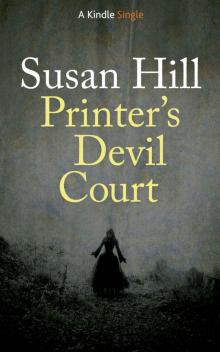 Printer's Devil Court
Printer's Devil Court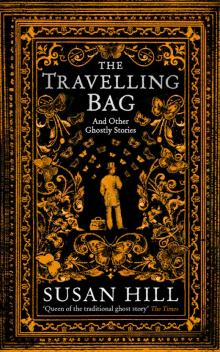 The Travelling Bag
The Travelling Bag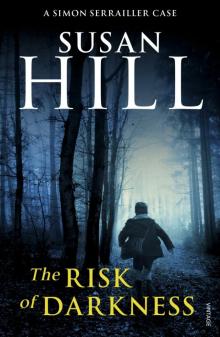 The Risk of Darkness
The Risk of Darkness A Kind Man
A Kind Man Black Sheep
Black Sheep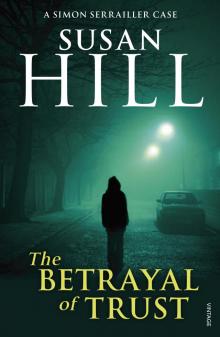 The Betrayal of Trust
The Betrayal of Trust The Service of Clouds
The Service of Clouds Betrayal of Trust
Betrayal of Trust The Small Hand
The Small Hand Dolly
Dolly Jacob's Room Is Full of Books: A Year of Reading
Jacob's Room Is Full of Books: A Year of Reading The Vows of Silence
The Vows of Silence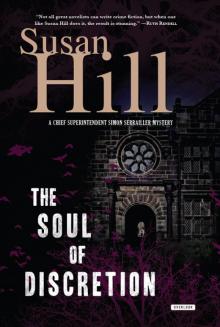 The Soul of Discretion
The Soul of Discretion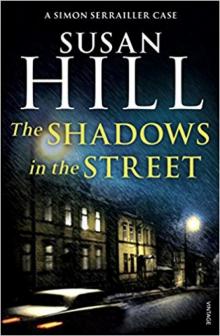 The Shadows in the Street
The Shadows in the Street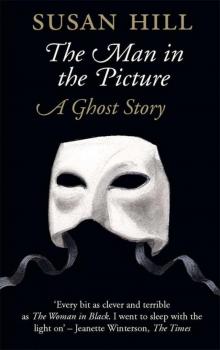 The Man in the Picture
The Man in the Picture Air and Angels
Air and Angels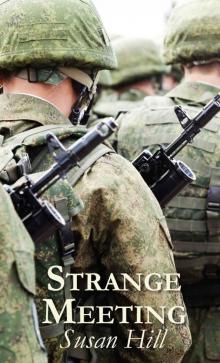 Strange Meeting
Strange Meeting In the Springtime of the Year
In the Springtime of the Year Howards End Is on the Landing: A Year of Reading From Home
Howards End Is on the Landing: A Year of Reading From Home From the Heart
From the Heart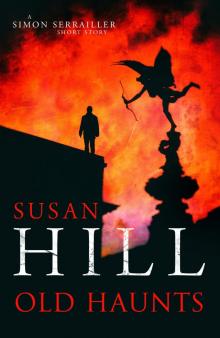 Old Haunts
Old Haunts The Mist in the Mirror
The Mist in the Mirror The Woman in Black: A Ghost Story
The Woman in Black: A Ghost Story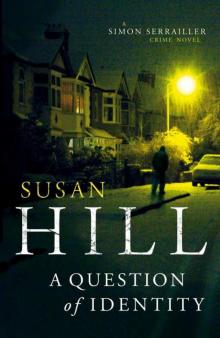 A Question of Identity (Simon Serrailler 7)
A Question of Identity (Simon Serrailler 7) The Comforts of Home
The Comforts of Home Mist in the Mirror
Mist in the Mirror Jacob's Room is Full of Books
Jacob's Room is Full of Books The Woman in Black
The Woman in Black Howards End is on the Landing
Howards End is on the Landing